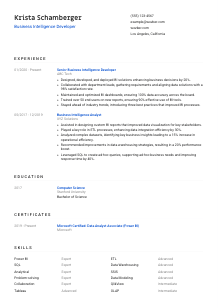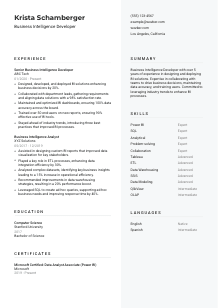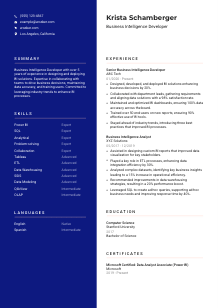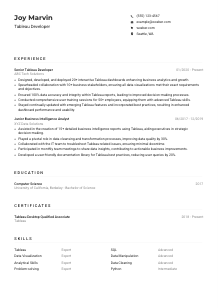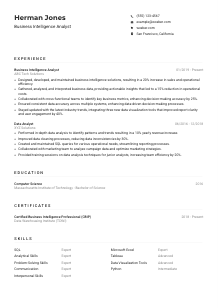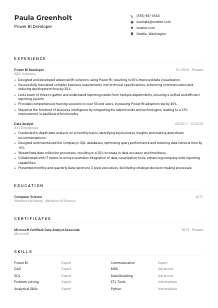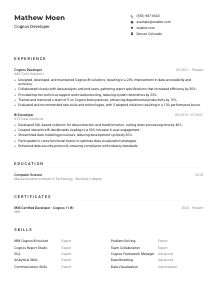Business Intelligence Developer Resume Example
Deciphering data, but your resume doesn't compute? Explore this Business Intelligence Developer resume example, structured with Wozber free resume builder. Witness how intuitively you can code your analytics expertise into a format that clicks with job algorithms, positioning your career for a strategic breakthrough!
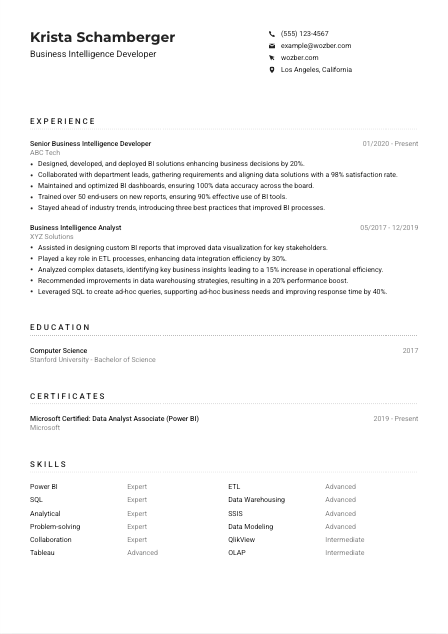
How to write a Business Intelligence Developer resume?
Greetings, aspiring Business Intelligence Developer! In a world where data is king, having the skills to decipher and leverage information is your superpower. But before you can use this power to drive business decisions, you need to embark on the first crucial mission – landing the job. This guide, powered by Wozber's free resume builder, will navigate you through the art and science of developing a resume that's not just a list of jobs but a compelling narrative of your professional journey.
With a focus on ATS optimization, this guide will ensure your resume not just reaches the hiring manager's desk but demands attention. Let's turn your resume into a data-driven success story!
Personal Details
The personal details section is your resume's front door. It's crucial to make a strong first impression that's both professional and aligned with the Business Intelligence Developer role. By tailoring this section, you showcase your attention to detail and your fit for the role right from the start. Let's walk through how to perfect this section.
1. Lead with Your Name
Your name is the anchor of your resume. Ensure it's prominently displayed using a clear, professional font. This isn't just about aesthetics; it's about making sure your brand, that is, YOU, stand out from the crowd.
2. Mirror the Job Title
Immediately beneath your name, align yourself with the role by including the job title you're applying for - in this case, "Business Intelligence Developer." This simple act of mirroring the role's title tells the hiring manager, at a glance, that you see yourself in this position.
3. Keep Contact Info Professional and Precise
Include your phone number and a professional email address. A pro-tip is to create an email address dedicated to your job search, using a format such as firstname.lastname@email.com. This keeps your application organized and underscores your professionalism.
4. Map Your Location to the Role
Since the job is located in Los Angeles, California, highlight your location as "Los Angeles, California" if you're in the vicinity. This signals to employers that you're readily available and eliminates any concerns about relocation.
5. Add a Touch of Personal Branding
If you have a LinkedIn profile or a professional website, include it here. Ensure your LinkedIn profile mirrors your resume to maintain consistency. This offers the hiring manager a deeper dive into your professional world.
Takeaway
Think of the Personal Details section as the key to unlocking the potential of your resume. Keep it clean, precise, and aligned with the Business Intelligence Developer role you're targeting. Remember, the goal is to make it as easy as possible for the hiring manager to see you as a fitting candidate. A strong, clear opening sets the stage for the detailed narrative that follows.





Experience
Shine a light on your journey as a Business Intelligence Developer. This section is where you demonstrate how your past experiences make you the ideal candidate for the role at hand. Let's deep dive into curating a powerful experience section that speaks volumes to hiring managers.
- Designed, developed, and deployed BI solutions enhancing business decisions by 20%.
- Collaborated with department leads, gathering requirements and aligning data solutions with a 98% satisfaction rate.
- Maintained and optimized BI dashboards, ensuring 100% data accuracy across the board.
- Trained over 50 end‑users on new reports, ensuring 90% effective use of BI tools.
- Stayed ahead of industry trends, introducing three best practices that improved BI processes.
- Assisted in designing custom BI reports that improved data visualization for key stakeholders.
- Played a key role in ETL processes, enhancing data integration efficiency by 30%.
- Analyzed complex datasets, identifying key business insights leading to a 15% increase in operational efficiency.
- Recommended improvements in data warehousing strategies, resulting in a 20% performance boost.
- Leveraged SQL to create ad‑hoc queries, supporting ad‑hoc business needs and improving response time by 40%.
1. Align with the Job Requirements
Scrutinize the job posting and align your listed experiences with the required skills and responsibilities. For instance, if the job emphasizes "designing, developing, and deploying BI solutions," make sure your experience reflects similar projects.
2. Position with Precision
Organize your professional experience in reverse chronological order, spotlighting your most recent and relevant roles. Be sure to include your job title, the company name, and your tenure there.
3. Highlight Pertinent Achievements
Make each bullet point an opportunity to showcase how you've contributed to your previous roles, directly mirroring the job description. For example, detail how you "Collaborated with stakeholders to ensure data solutions met business needs," mirroring the responsibilities section.
4. Quantify Your Impact
Numbers attract attention. Whenever possible, quantify your achievements, such as "Enhanced business decision-making abilities by developing BI solutions that resulted in a 20% increase in efficiency." This tangible evidence of your impact makes your accomplishments more relatable and impressive.
5. Prioritize Relevance Over Length
Keep your experience pertinent to the role of a Business Intelligence Developer. While it might be tempting to list all your achievements, prioritize those that resonate most strongly with the job description to keep the hiring manager's attention focused on your applicable skills.
Takeaway
The experience section of your resume should read like the story of why you're the perfect match for the Business Intelligence Developer role. It's about weaving a narrative where each bullet point adds a layer to your professional story, ultimately convincing the hiring manager that you're not just suitable for the job but indeed the best choice. Use Wozber's free resume builder to ensure your resume is ATS-compliant and stands out from the competition.
Education
In the fast-evolving field of Business Intelligence Development, your education lays the groundwork for your expertise. Let's ensure your educational background is presented in a way that aligns perfectly with the role's requirements and highlights your preparedness for the challenges ahead.
1. Match the Degree to the Job
Identify the educational requirement from the job listing and reflect it precisely in your resume. For the Business Intelligence Developer role requiring a "Bachelor's degree in Computer Science, Information Technology, or a related field," ensure your degree is listed in a clear, straightforward manner.
2. Keep It Structured
Maintain a simple and readable format by listing your degree, the institution's name, and your graduation date. This clean presentation makes it easy for hiring managers to verify your qualifications at a glance.
3. Tailor Your Degree Details
If you have the specific degree mentioned in the job description, like a "Bachelor of Science in Computer Science," make sure it's prominently featured on your resume. This creates an immediate connection between your qualifications and the job's requirements.
4. Highlight Pertinent Courses, If Applicable
For roles that demand specific skill sets, such as Business Intelligence Development, listing relevant courses can bolster your qualifications, especially if you're early in your career or the role is highly specialized.
5. Showcase Other Academic Achievements
If you've achieved honors, participated in relevant extracurricular activities, or completed significant projects or thesis work that dovetails with Business Intelligence, include these details to add more depth to your educational background.
Takeaway
Your education section is a testament to your foundational knowledge and your drive for learning. When crafted with precision, it not only meets the checkmark for qualifications but also showcases your dedication to the field of Business Intelligence Development. Let each line affirm your readiness for the challenges and innovations inherent in this role.
Certificates
In the realm of Business Intelligence Development, certifications are golden. They validate your expertise and commitment to ongoing learning. Whether it's a mastery of Power BI or a certification in data analytics, let's ensure your certifications shine brightly on your resume.
1. Draw from the Job Description
Although the job description might not list specific certifications, identify the skills and tools emphasized—like Power BI—and list any certifications you have in these areas. This demonstrates both competency and initiative.
2. Prioritize Relevance
Listing certifications that directly relate to the job's needs or preferred qualifications can set you apart. For instance, a "Microsoft Certified: Data Analyst Associate (Power BI)" certification directly aligns with the requirement for expertise in Power BI and should be prominently featured.
3. Be Clear About Validity
For certifications that have expiration dates or require renewal, including the date obtained or the validity period can demonstrate your commitment to staying current in your field.
4. Keep Learning and Certifying
The tech world moves fast, and so should you. Continuously seek out certifications that bolster your expertise and keep you at the forefront of Business Intelligence Development trends. This attitude of perpetual learning is a valuable asset to potential employers.
Takeaway
Your certifications act as powerful endorsements of your skills and knowledge in the Business Intelligence domain. By wisely selecting and presenting these credentials, you signal to employers your dedication to excellence and your readiness to tackle the challenges of today's data-driven decisions. Use certifications to underscore your expertise and commitment to professional growth.
Skills
Your skills section is where you encapsulate your professional toolkit for the Business Intelligence Developer role. It's about presenting a blend of hard and soft skills that align perfectly with the job's demands. Let's dive into fine-tuning this critical part of your resume.
1. Decode and Align
Thoroughly review the job description and pinpoint both the explicit and implicit skills required. Skills like proficiency in "SQL" and experience with "relational databases" are explicit, while "excellent analytical and problem-solving skills" are more implicit but equally crucial.
2. Match and Organize
List the skills you possess that are most relevant to the job at hand. Start with hard skills like "Power BI expertise" and then incorporate soft skills like "analytical thinking" and "problem-solving" capabilities. This showcases a well-rounded skill set.
3. Neatness Counts
Resist the temptation to list every skill you've ever acquired. Instead, curate a focused list of skills that speak directly to the needs of the role you're applying for. This targeted approach makes it easier for hiring managers to see you as the right fit.
Takeaway
The skills section offers a snapshot of the unique blend of abilities you bring to the Business Intelligence Developer role. Thoughtfully selecting and presenting these skills tells the hiring manager not just who you are, but how you'll add value to their team. Keep refining your skill set, always with an eye on relevance and impact.
Languages
In today's global business environment, linguistic skills can be a significant asset, enhancing communication and collaboration across borders. While the core focus for a Business Intelligence Developer may be on technical and analytical skills, let's not overlook the value of language skills.
1. Align with Job Necessities
First, verify if the job description specifically mentions language requirements or preferences. In our case, "Competence in both spoken and written English is essential," so make sure your proficiency in English is highlighted.
2. Feature Essential Languages
List languages relevant to the role first, specifying your level of proficiency clearly. This is crucial for roles that may involve communication with clients or teams in different geographic locations.
3. Showcase Additional Languages
Additional languages can set you apart, especially in roles requiring or benefiting from multicultural communication. Even if not directly related to the job, they reflect your ability to adapt and connect in a diverse world.
4. Be Honest About Your Proficiency Levels
Accuracy in representing your language proficiency—from 'native' to 'basic'—is key. This honesty ensures expectations are set correctly and can help foster trust from the outset.
5. Evaluate the Global Scope
Consider the role's requirements in terms of global interaction. If the position involves working on international projects or with clients from different cultural backgrounds, your multilingual abilities could be a unique selling point.
Takeaway
Whether it's facilitating smoother communication on a project or enabling better understanding with clients from varied backgrounds, linguistic skills can be an invaluable part of your resume. View each language you speak as a bridge to new opportunities, showcasing your ability to operate in the increasingly global marketplace of ideas and innovation.
Summary
The summary section of your resume provides a golden opportunity to distill your professional essence into a few compelling sentences. Crafting an effective summary is an art— one that communicates your most relevant qualifications, skills, and career achievements at a glance. Let's master this art together.
1. Digest the Job's Core
Start by absorbing the essence of the job role. Understanding what makes the role tick—its core purposes and challenges—provides the foundation for your summary.
2. Introduce Yourself
Begin with a statement that showcases your professional identity. For example, "Dynamic Business Intelligence Developer with over five years of experience in enhancing business decision capabilities through innovative BI solutions."
3. Tie in Key Requirements
Weave in a few skills or achievements that echo the job's key requirements. Highlighting experiences such as developing BI solutions, optimizing data accuracy, and staying abreast of industry trends directly responds to the job's demands.
4. Keep It Snappy
The art of the summary is in brevity and impact. Keep your summary concise yet potent, ensuring it packs a punch and leaves the hiring manager wanting to learn more about you.
Takeaway
The summary is your resume's elevator pitch—short, impactful, and designed to grab attention. It's your chance to tell the hiring manager, "This is who I am, and here's how I can solve your problems." Tailor it to resonate with the Business Intelligence Developer role, and you'll set the stage for a resume that truly stands out. As you craft your perfect resume, remember to leverage Wozber's free resume builder for ATS optimization, ensuring you meet both the human and the machine criteria. Let's make your resume the key to unlocking your next great opportunity.
Launching Your Business Intelligence Developer Journey
Congratulations on completing this comprehensive guide to crafting a standout resume for the Business Intelligence Developer role. With your professional narrative now vividly outlined and optimized for both ATS systems and human eyes, you're ready to embark on this exciting career path. Remember, your resume is a living document, reflecting your growing expertise and achievements. Keep it updated, and continue to tailor it with precision for each opportunity that arises.
Armed with your data-driven insights and Wozber's ATS-compliant tools, you're well on your way to becoming an indispensable asset to any business intelligence team. The world of data awaits your expertise—the stage is yours to claim!

- Bachelor's degree in Computer Science, Information Technology, or a related field.
- Minimum of 4 years experience in BI development using tools such as Power BI, Tableau, or QlikView.
- Strong proficiency in SQL and experience with relational databases.
- Familiarity with BI technologies such as ETL, OLAP, and data warehousing.
- Excellent analytical and problem-solving skills with the ability to work collaboratively in a team environment.
- Competence in both spoken and written English is essential.
- Must be located in Los Angeles, California.
- Design, develop, and deploy BI solutions that enhance business decision-making capabilities.
- Collaborate with stakeholders to gather requirements and ensure data solutions meet business needs.
- Maintain and optimize existing BI dashboards and reports while ensuring data accuracy.
- Train end-users on new reports and dashboards to ensure effective use of BI tools.
- Stay updated on industry trends and best practices to continuously improve BI processes and tools.





